Swedish increasingly important to KTH

Being Sweden's second most international university is a privilege, but it also has its challenges. With fewer and fewer Swedish-speaking employees, KTH risks its role as an important participant in society, and could have trouble recruiting the leaders of the future. A language learning plan is required when hiring international staff, something few are aware of.
KTH is an international university with a large number of nationalities working alongside each other. International employees contribute to the competitiveness of KTH, but there are also challenges that arise when only a minority of the academic staff speak Swedish. Many research environments at KTH today are entirely English-speaking, a situation that is somewhat alarming, according to Rebecca Hincks, head of the Language and Communication unit that provides KTH with language education.
”We can quickly reach a critical situation at KTH with too few who know Swedish. That would affect many people's work situation,” says Rebecca Hincks.
By law, KTH must use Swedish, the official language of government authorities, she explains. This means that today a shrinking group of Swedish speakers must take on a range of duties and assignments. This can affect their careers since it takes time from their research.
But it also means limited career opportunities at KTH for those who never learn the language. They can’t, for example, become heads of departments or schools - nor president of the university. Without language skills, integration into Swedish society becomes poorer, which can mean that the employee chooses to leave KTH, which is a bad investment for the university, says Rebecca Hincks.
Charlotte Hurdelbrink is responsible for Swedish education for employees at Language and Communication. She emphasizes the importance of quickly getting started with the Swedish studies to be prepared when you are expected to teach in the new language.
“At basic education levels at KTH you teach in Swedish. This comes with high expectations, and for many this is a very stressful situation”, she says.
According to the employment scheme at KTH, those responsible for recruiting international employees without Swedish knowledge must put together a language education plan. Not many are aware of the these requirements, or take them seriously.
”It’s not easy to make such a plan if you lack understanding of what is reasonable and possible to achieve. We are happy to help out with putting together the plan. We know how to learn a language”, says Charlotte Hurdelbrink.
At Language and Communication, a template for a language plan is being developed, and initially it will be offered to the ITM School. Hopefully this will spread at KTH. Rebecca and Charlotte would like to see more initiatives from managers showing responsibility for the language skills of the employees.
“We’d also like to see ‘language mentors’ at the departments, who encourage employees to speak Swedish”, says Charlotte Hurdelbrink.
One obstacle to hearing Swedish in the corridors is that it is difficult to set aside time for employees to study languages. Travel and work consume time. The plans should also set out time for language learning, Rebecca Hincks points out. And there are a plenty of courses to choose from: Courses for groups or individual lessons where you can focus on exactly what the employee needs.
And why should you have the courses here at KTH?
”We try to create content in sync with KTH's everyday life. We address topics such as sustainability, societal and equality issues, development dialogues… And participants learn how to describe their research in Swedish. But we always want more input to improve - what do you think is important to be able to express in Swedish? Contact us”, says Charlotte Hurdelbrink.
The courses involve a course fee, but the language cafés that are arranged several times a week are free. Over a lunch snack, a teacher leads a discussion on a topic that has been decided in advance.
“This is an easy way to start if you have only a little knowledge in Swedish”, Charlotte says. “It is fun to master a language. But it takes work-- around 1000 hours to learn a language.”
Text and photo: Anna Gullers
